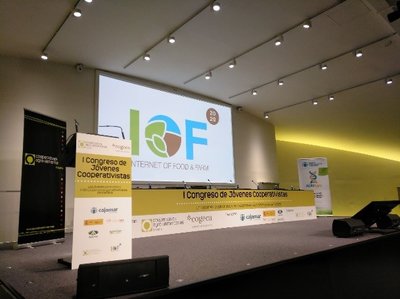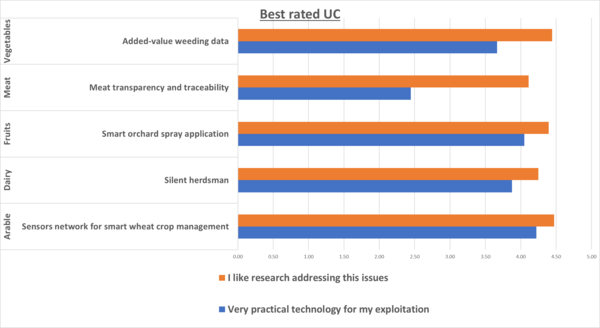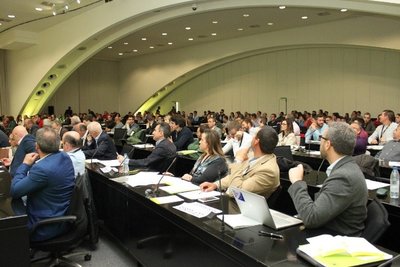On the 21st and 22nd of March, a Young Cooperative Members Congress was held in Valencia. It was organised by Spanish Co-ops with the support of the Confederation of EU Agri-food Co-operatives (COGECA). During this congress, titled "Young Producers and Agri-food Cooperatives of Tomorrow", 300 young people from multiple regions of Spain and other European countries participated. The generational shift in agriculture and livestock is one of the most important challenges the agri-food sector is facing throughout the European Union and especially in Spain, where the rate of young people working in the sector is among the lowest.
During the first day a COGECA Business Forum took place and a situation analysis was carried out through round tables with young members and representatives of cooperatives from all over Europe. The aim of these round tables was to better understand the needs of young farmers and their proposals for a more lively, innovative and attractive rural environment as well as the role that cooperatives can play as an instrument to respond to their needs. On the second day, focused on the national level, the tools in favour of generational change that have been foreseen in the current CAP alongside the one coming up in 2020 were analysed. 
To conclude the congress, Gonzalo Martín, director of Hispatec Analytics (partner of IoF2020), explained how digitalisation can help cooperatives and the farms themselves to achieve greater competitiveness, lower production costs and a more sustainable and environmentally friendly agricultural activity. Sharing the available data is an asset that cooperatives have to facilitate, setting a good basis for developing this type of digitisation tools with greater guarantees and ease, even more so in Spain, the country in the world where the mobile phone has had the greatest penetration (88%). To this end, he indicated the need to work on the three main components of digitalisation: communications for greater territorial connectivity, automation for increased efficiency, and the use of big data to gather as well as process experience and knowledge in an objective manner.
Parallel to the congress and over the course of both days, five interactive sessions were organised addressing young cooperative members from different sectors (between 10 and 40 participants in each one). These sessions were held with the aim of sharing and gathering information about the digitalisation and IoF2020 progresses. In total, all 33 use cases were presented, collecting in situ the main impressions of the attendees by means of an online application accessed through their smartphones.
 In the case of the fruit trial, attendees showed a special interest in the Smart Orchard Spray Application use case, focusing on a wireless connection of the tractor and the atomizer to a database in the cloud, permanently fed with information collected by IoT devices. Through it, work orders are generated depending on the crop, achieving precision applications that will optimise application rates and ultimately costs.
In the case of the fruit trial, attendees showed a special interest in the Smart Orchard Spray Application use case, focusing on a wireless connection of the tractor and the atomizer to a database in the cloud, permanently fed with information collected by IoT devices. Through it, work orders are generated depending on the crop, achieving precision applications that will optimise application rates and ultimately costs.
In the dairy trial, the integration of data collected from GPS collars with accelerometers along with information obtained through milking robots and the analysis of the composition of milk attracted the most interest among farmers. The Herdsman use case obtains all this information to provide recommendations and early warnings.
Regarding the meat trial, the use case Meat Transparency and Traceability which employs similar collars in combination with pedometers for early detection of lameness (reducing costs of antibiotic treatments) stood out and found the greatest applicability among livestock farmers.
Professionals linked with the horticultural trial opted for the Added-value Weeding Data use case, where an intelligent machine can discern the type of plant present, as well as the need to eliminate it or not.
Finally, in the arable trial, the use case Precision Crop Management was the one that aroused the greatest interest among young professionals. In this use case water and nitrogen measurements are taken in real-time to assess the needs and develop precision agronomic models for the achievement significant savings.
 Similarly (and within framework of the IoF2020 project), several questions were addressed to the plenary with the aim of finding out the profile and digitalisation interests of the attendees. In this sense, the age group most represented among the almost 150 young cooperative members was 26 years old, especially attendees linked to the fruits trial (40%). Another notable fact was the small number of attendees who reported using digital media in the field to complete the field notebook, making the paper format and the support of a technician the preferred options for performing this task.
Similarly (and within framework of the IoF2020 project), several questions were addressed to the plenary with the aim of finding out the profile and digitalisation interests of the attendees. In this sense, the age group most represented among the almost 150 young cooperative members was 26 years old, especially attendees linked to the fruits trial (40%). Another notable fact was the small number of attendees who reported using digital media in the field to complete the field notebook, making the paper format and the support of a technician the preferred options for performing this task.
Most of the professionals stated their willingness to pay for digitalisation mainly in two scenarios. First case would imply cost reduction through the precise application of fertilisers, phytosanitary products, etc. Second case would be allowing them to have a real time control of the exploitations via their smartphones. About the role that the cooperative should play in the digital transformation, 37% of the participants preferred the profile of a cooperative “closing” deals to reduce the cost of digital assets for its associates. Another 25% voted for cooperatives as elements of support for this transformation.